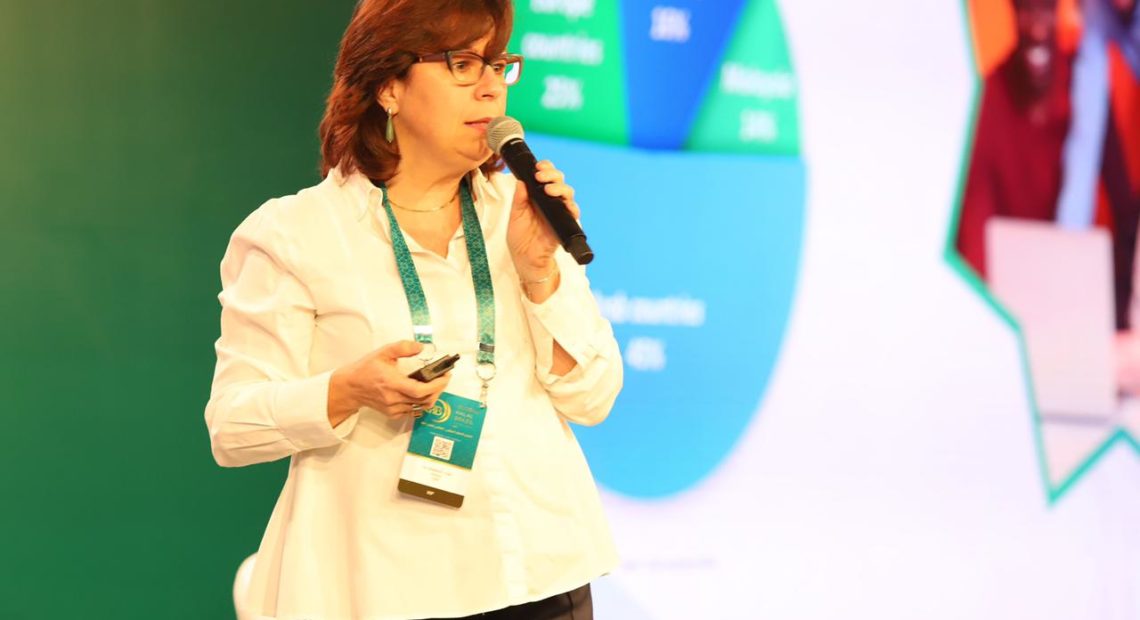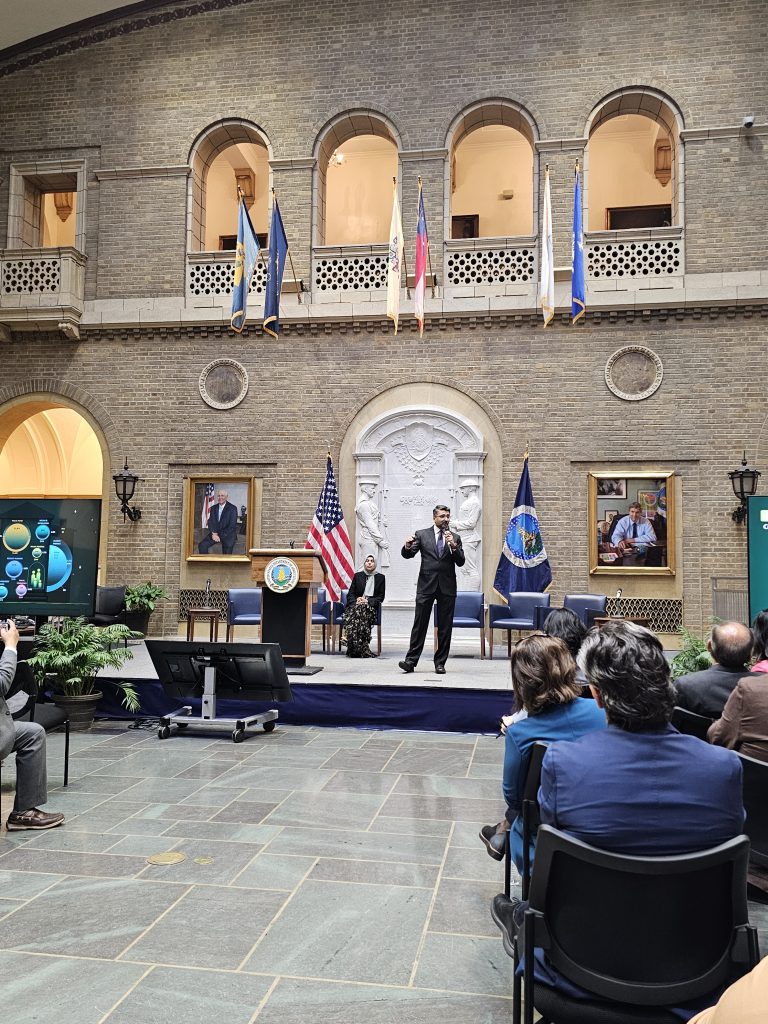The 3rd annual American Muslim Consumer Conference (AMCC) will be held on Saturday, October 29th at Hotel Hyatt Regency in New Brunswick, New Jersey from 9 AM to 5 PM.
The conference is held annually attracting over 350 to 400 diverse attendees: from community members and leaders, entrepreneurs, professionals, and marketing/advertising/PR executives. Following are confirmed speakers for 2011 AMCC:
Tariq Farid – Founder and CEO, Edible Arrangements International, Inc.
Layla Mandi – Founder & CEO, OnePure
Gwen Kelly – Senior Marketing Manager, Walmart
Jalel Aossey – Director, Midamar Corporation
Errol Schweizer – Global Grocery Buyer, Whole Foods Market
Susan Labadi – Editor in Chief, HalalConnect Magazine, American Halal Association
Ibrahim Abdul-Matin – Author, “Green Deen”
Peter Gould – Designer, Peter-Gould.com
Moose Scheib – CEO, LoanMod.com
Kamran Pasha – Screenwriter & Director, Hollywood
Maria Ebrahimji – Director & Executive Editorial Producer, CNN Worldwide
Adnan Durrani – Founder and CEO, American Halal Company
Abdalhamid Evans – Director, Imarat Consultants
Jane Carten – Director & President, Saturna Capital
Haroon Mokhtarzada – Co-Founder & CEO, Webs.com
Nausheena Hussain – Multicultural Marketing, Best Buy
Dilawar Syed (Tentative) – President & CEO, Yonja Media Group
Rushdi Siddiqui – Global Head, Islamic Finance & OIC Countries Thomson Reuters
Since the launch of first AMCC in 2009, we have been working to understand and address the needs of American Muslim Consumers and promote companies/entrepreneurs who are developing products for this market.
At 2010 Conference, Ogilvy and Mather one of the leading marketing and advertising agency released a research report on American Muslims “A little empathy goes a long way: How brands can engage the American Muslim consumer”. The report revealed that 86% of American Muslim Consumers believe that American Companies “need to make more of an effort to understand Muslim values” but at exactly the same time they are feeling largely ignored by American brands and companies with 98% feeling that “American brands don’t actively reach out to Muslim Consumers”.
The theme of the conference this year will be “Multiculturalism and the American Muslim Consumer Market”. This will be a landmark conference highlighting the opportunities and potential which mark the American Muslim Consumer market as a valuable niche (similar to the Hispanic market a decade ago and today this market stands at $1.4 Trillion).
The purchasing power of American Muslims is estimated to be about $200 Billion annually, however there are very few brands and limited products servicing the need of American Muslims. JWT’s 2007 study of ‘one of America’s biggest hidden niche markets’ revealed that the American Muslim consumers represent “a neglected market with huge potential for brands that are willing to connect with them.”
This consumer landscape can be broken down into two categories. The first, consumer products and services that a Muslim household spends on, that are not unique for Muslim consumers alone, and the second, products and services that are customized for Muslim Consumer unique needs.
The first category is where marketing focus is needed on custom communication, targeted media reach and building loyalty. The second category is where customized Muslim products/services or dedicated business lines are developed.
There are some key questions that arise for marketers in formulating an effective American Muslim marketing strategy. Almost half of the American Muslims are indigenous and the recent immigrant populations are already into their second or third generations. As a result, many consumer behavior aspects are reflective of the general American consumption patterns. From buying cell phones to drinking soft drinks, the American part of their identity prevails. However, a variety of Muslim market specific product categories and levels of customization opportunities do exist.
In recent years we have seen a mainstream company like Best Buy Inc., a major retailer of electronic products, in America launching various marketing communication to target American Muslims. One such communication was acknowledging a Muslim holiday “Eid al-Adha,” for the first time in a national advertisement.
Iconic American companies such as McDonald’s (which already has a popular halal menu overseas) and Wal-Mart have entered the halal arena. In August, the natural grocery giant Whole Foods began selling its first nationally distributed halal food product — frozen Indian entrees called Saffron Road.
American Muslim Entrepreneurs have also launched many companies targeting the Muslim Consumers. In the area of Islamic Finance we have seen emergence of companies like Amana Mutual Fund in Sharia Compliant Mutual Fund, Guidance Residential and University Islamic Financial in home mortgages and Zayan Financial in Takaful home insurance products.
In the area of Halal Food, Crescent Food, Saffron Road and Midamar are emerging as a mainstream brand.
There is a big buzz about the Muslim lifestyle market, where the fashion industry is constantly looking for new influences, and is shaped by grassroots trends, as well as different cultures. Fashion is a global phenomenon, and that the rising market is with young Muslim consumers who embrace and fuse together both fashion and faith in order to express their identity. JaanJ’s (www.JaanJ.com) collection of non silk vegan ties will surely captivate you with its trendy design.
The American Muslim market today has a fast growing diverse set of media and forums that enable access to it. From fast growing online networks such as Zabihah.com, Illumemag.com, Islamicity.com and Elanthemag.com to publications such as Azizah magazine(for American Muslim women) and regional newspapers, a variety of media are fast maturing with captive audiences that reflect the full fabric of American Muslim society are becoming popular in bringing issues of American Muslims in the forefront.
From food to fashion to finance, buying Muslim is a big opportunity and consumer brands in the U.S. who are smart enough to embrace them will experience firsthand their spending power, brand loyalty and brand advocacy. The increased support and buzz around this emerging consumer segment is good for the Muslim community, brands seeking to court them and the U.S. economy. And as the outlook for significant top-line growth and overall economic recovery still looks gloomy in many sectors, look for more brands, mainstream and Muslim-owned, to begin to make efforts to gain the attention and loyalty of a significantly important and underserved demographic in the marketplace – the American Muslim Consumer.
For details please visit www.AmericanMuslimConsumer.com



